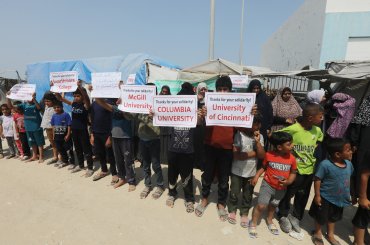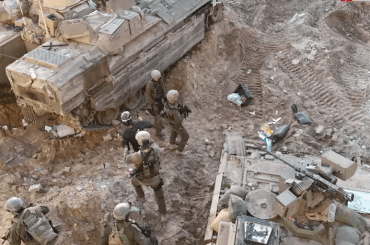As talk of the Palestinian bid for UN recognition looms, former American, Israeli, and Arab negotiators met at the US Institute for Peace on Wednesday, Nov 2nd. The gathering, which I attended, marked the 20th anniversary of the Madrid Conference, one of the first to bring Israeli and Arab leaders together for a face-to-face meeting. Many of the participants Wednesday acted as negotiators for the sides in 1991, and continue to be active in mediating agreements in the region. The day was marked by open frustration with American mediation efforts on the part of Palestinians and Arabs, and apparent apathy towards the resolving the problem by some Israelis.
James Baker, III, a former US Secretary of State, was responsible for convening and managing the Madrid Conference. “The window for a two-state solution continues to narrow as settlers keep moving into the occupied territories. With each new settler, it becomes harder for the Israeli government to make the compromise needed for peace. Correspondingly, Palestinian frustrations mount, increasing the influence of Hamas and even more radical organizations.”
Baker went on to criticize the United States for threatening to cut funding to Palestine, calling it “short-sighted”. He also disagreed with the American position on settlements, saying “I don’t understand how US can oppose settlements for 30 plus years, then veto a UN resolution opposing settlements.” Expressing his skepticism at the possibility of another peace agreement before the American elections in 2012, Baker said the Israeli government needed to “lean forward” for peace, and the Palestinians needed to unite internally.
A united Palestinian front, however, continues to be elusive, and there is plenty of blame to go around. Repeated attempts to sign a unity deal between Hamas and Fatah have fallen through, due at least in part to external pressure on Fatah by the United States and Israel to steer clear of their counterparts in Gaza.
Nimrod Novik, a former Chief Advisor on Foreign Policy to the Israeli President Shimon Peres, has spoken out in the past about the unacceptability of Hamas having power in Palestine. On Wednesday, Novik was dismissive of prospects for a lasting peace agreement, saying “dreams are out, practical solutions are in.”
Novik attempted to blame Palestinians for the pro-settlement approach of the current Israeli government, saying the “conduct of our neighbors affects Israeli elections”, and repeating the popular claim that “Palestinians have elected more Israeli Prime Ministers than anyone.” Novik lamented the cultural feelings of Arabs towards Israelis and a lack of “an absolute agreement to non-violence” from Palestinians. He said on of the foremost problems with the peace process was the need for educational reform in Arab countries.
But Israeli casualties have dropped to their lowest levels in decades, and the Palestinian Authority jumped onto the bandwagon of grassroots civil disobedience in the West Bank more than five years ago.
Nabil Sha’ath, a former Chief Negotiator and Foreign Minister for Palestine, praised the US role twenty years ago, saying they were able to impose equality between forces then, and were clear about ending settlements and the occupation. Today, he said, the US offered “no reprimands” to Israel for its behavior.
Sha’ath, at times unable to mask his frustration with his Israeli counterparts, said the Israelis needed to “stick to the terms of reference”, and implement their past agreements with Palestine. He said Palestine had secured the West Bank for Israel, and committed itself to non-violence. Israel, he said, had instead committed itself to building more settlements. “We cannot start from zero, but the current Prime Minister of Israel wants to start from zero…We cannot trade land for peace when our land is being taken out from under us,” Sha’ath said.
Saudi Prince Turki bin Faisal Al-Saud, a former head of intelligence and ambassador to the United States and United Kingdom, expressed his frustration with the pace of the peace process. It was “unimaginable, unwise, for the Arab World to say we give up on the peace initiative,”he said, but “we’ve had a whole load of plans, of rhetoric…come and say what we’re going to do.”
Turki blamed the Israelis for a lack of commitment to peace, pointing out that they rejected the Arab Peace Initiative- which would have broadly returned to the 1967 borders in exchange for Arab recognition of Israel. He was also critical of the US, saying the “biggest problem the US President has…is Congress, ” and that the President had to “dis-entangle himself from the AIPAC crowd.”
For those looking to President Obama to offer a way forward in negotiations, his unwillingness to come down hard on Israeli settlement building is a major obstacle.
On Wednesday, former Israeli diplomats were quick to point to domestic difficulties for their government in halting settlements, but failed to acknowledge the feelings of Palestinians, who clearly do not want settlements invading their villages, or settler-only roads crisscrossing their fields.
Israel may claim to have the only democratic system in the Middle East (if one ignores the occasional tossing out of Arab MP’s), but upholding this distinction has required the suppression of democracy among its neighbors for decades. American officials, used to decades of silence from the Arab world’s leaders, are unable to sense the changing weather. No longer will Palestinians and other Arabs, who no doubt oppose settlements with super majorities far greater than Netanyahu’s government enjoys, remain silent.
If the attack on the Israeli embassy in Cairo or the continuing debacle over exchanges of Israeli and Palestinian prisoners is any indication, without a doubt, any truly democratic leadership that emerges in the Arab world will no longer play along.
The current geo-political state of the world, particularly the Arab spring, was a matter of discussion throughout the conference Wednesday. When an Israeli pointed out that
the recent Israeli tent protests were different from the Arab protests because no one had been shot, it only underscored the fact that Israelis have often shot Palestinians when they undertake peaceful protest.
Nadia Bilbassy-Charters, a senior reporter from MBC, said that “like the young revolutionary on the Arab Street, [Palestinian President Mahmoud] Abbas was tired of putting up with it” so he went to the United Nations. The American reaction, of course, is not lost on the rest of the world, as Shibley Telhami, a professor at the University of Maryland pointed out , saying US policy in the Middle East was the prism through which the world saw all US policy.
The United States is seen by many in the world as stalling for Israel as it grabs more and more land, making a two-state solution impossible. When major violence flares up, as it did with Israel’s Operation Cast Lead three years ago, Israel and the United States can no longer count on Arabs to show restraint. At the conference, Israelis and Americans seemed most fearful of the intervention of countries like Egypt in the conflict. Robert Satloff, Executive Director of the Washington Institute for Near East Policy, called the fact that no interstate war had resulted from the Second Intifada – a conflict that by his own admission killed more than five thousand people, mostly Palestinian – an “American achievement.”
If the United States wants peace in the region, it must be willing to allow the Palestinians even a discretionary degree of democratic lateral. While Israel continues to defy international law and its own previous agreements, the Arab world – including the Palestinians- is moving forward. If the un-apologetic attitude exhibited by Israeli negotiators and American diplomats on Wednesday is indicative of wider sentiments, it seems Palestinians may have to look elsewhere for partners in solving their crisis.
Umar Farooq is a Baltimore-based activist and freelance writer. He spends his time trying to find a solution to the dilemmas of identity and faith in the modern nation state. Visit his blog at umarfarooqblog.wordpress.com, or follow him on Twitter: @UmarFarooq_


Baker has nothing to lose and thus is one of the few people in Washington free to speak out with the truth.
>> “I don’t understand how US can oppose settlements for 30 plus years, then veto a UN resolution opposing settlements.”
Neither do I. Must be one of those “nuances” things…
I like Baker despite his Repub credentials.I doubt Baker recongizes the GOP party today as the party he joined long.
Baker is the exact hard ass mafia don we need to deal with Israel.
Had Sr or Jr given Baker free rein on Israel and I/P it would all be over by now.
RE: “Novik was dismissive of prospects for a lasting peace agreement, saying ‘dreams are out, practical solutions are in.’ ” ~ Umar Farooq
MY COMMENT: In other words, “apartheid or bust!”*
* most likely “apartheid AND bust!”
Back in 2003 I read a news report that stated whenever Bush’s name came up Baker’s critique of the president was “scathing.” My first thought was oh-oh, the shrub has made an enemy of the grey eminence and master architect of the Bush dynasty?
Whether in or out of government the US has a powerful aristocracy of merit, and Baker is right at the top of the power pyramid. Only a fool crosses Baker as the shrub had learned. The Zionists had better do all they can to defeat Obama and elect another shrub as POTUS.